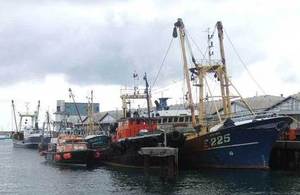Consultation for demersal discard ban launches
A consultation to prepare for the demersal discard ban in January 2016 has now launched.

Fishing vessels
Ensuring our fishermen can financially benefit from the second phase of the discard ban, which will end the wasteful practice that sees good fish thrown overboard, is the subject of a consultation launched today by Fisheries Minister George Eustice.
Pelagic fishermen, whose catch includes herring and mackerel, were banned from the practice this month – this will be extended to the demersal fleet, whose catch includes plaice, hake and cod, in January 2016.
Today’s (23 January) consultation considers how to implement the demersal ban in England, seeking views of those affected on the best ways to manage the landing obligation so our fishermen can benefit financially while fishing more sustainably.
Commenting on the launch, Fisheries Minister George Eustice said:
The discard ban is one of the most important changes to fisheries management in the last decade and follows three years of hard fought UK-led negotiations in Europe.
We’re working closely with industry and the EU to ensure the discard ban is applied proportionately and works in practice for all fishermen. It’s crucial we help them adjust to the new reforms and make the transition to each phase of the ban as smooth as possible.
This consultation and our research will inform how we handle fish that would have previously been discarded so it can be put to the best use, allowing us to achieve our shared goals of a thriving fishing industry, sustainable fish stocks and a healthy marine environment.
The consultation will run until the 31 March 2015 and strengthen our negotiating position in Europe with crucial evidence, allowing us to develop an appropriate, fair and effective Discard Plan with member states we share demersal fisheries with.
In addition we are undertaking national research to identify uses for previously discarded fish such as bait and fishmeal, and uncovering species with high survivability rates which could be exempted from the demersal discard ban. Together with the consultation this research will help us to make the most of the regional flexibilities the UK secured as part of the reformed Common Fisheries Policy.
More information:
-
Responses to the consultation can be made: * using the online survey on our consultation
-
To help prepare for the demersal ban we have been undertaking national research which includes: * identifying uses for previously discarded fish such as bait and fishmeal and working with the industry to ensure this fish is managed appropriately once onshore and directed to appropriate markets * improving the selectivity of fishing gears (through our long-term ASSIST programme) so the amount of unwanted by-catch is reduced in the first instance, as well as uncovering species with high survivability rates which could be exempted from the demersal discard ban. Defra funded research into plaice survivability is currently underway in Eastbourne
-
In addition we will be encouraging our fishermen to take advantage of funding available from the middle of the summer through the new European Maritime and Fishing Fund. Using this fund fishermen will be able to apply for support to purchase highly selective gears, develop new and innovative fishing gears that are suitable for their local circumstances and help to develop markets for the fish that was previously discarded.
-
We are also looking at improving our quota management systems and the possibility of applying de-minimis discarding exemptions where further selectivity is too difficult to achieve, or where landing the fish would exert a disproportionate cost on industry.